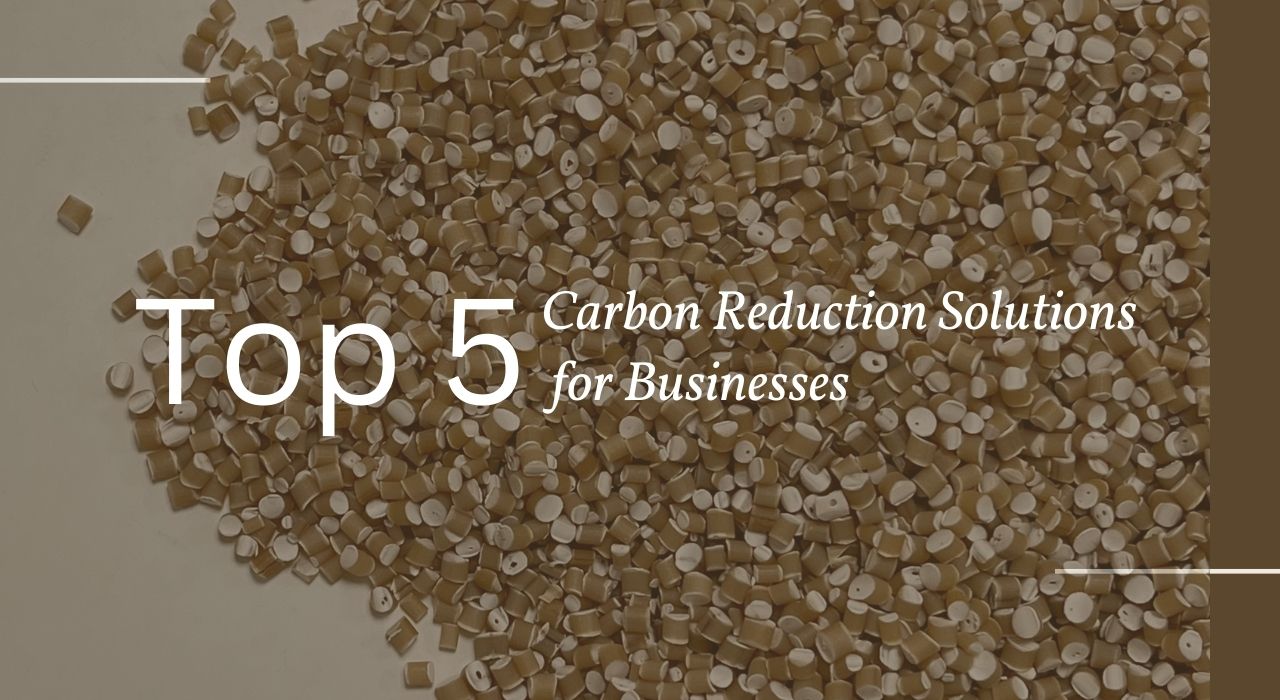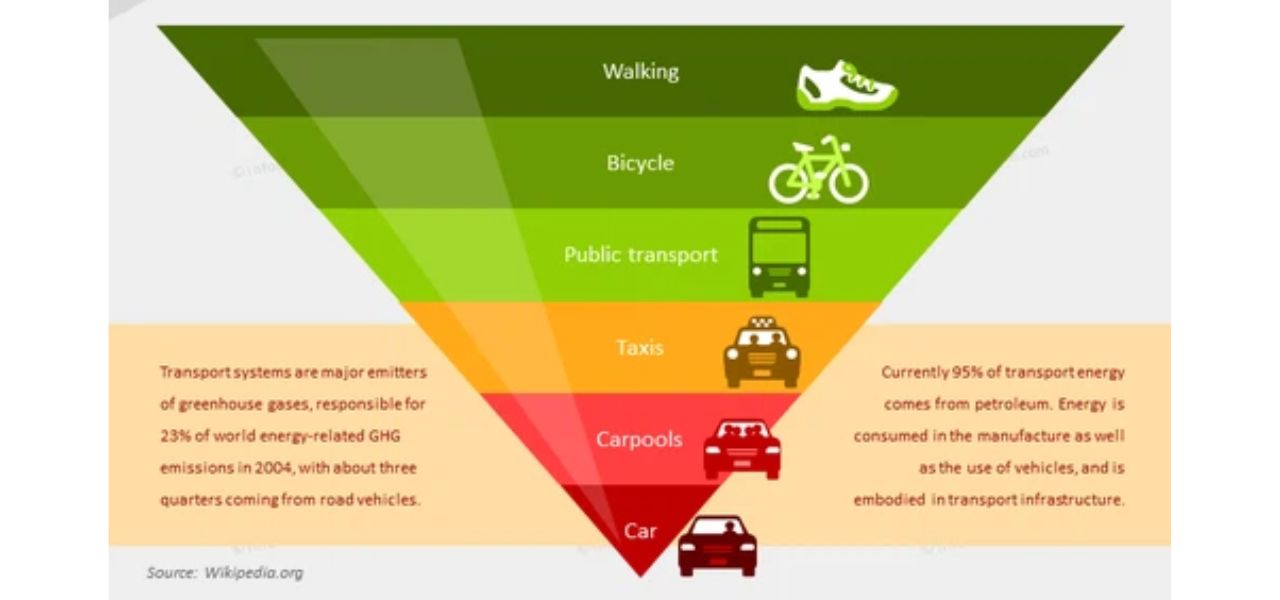Top 5 Carbon Reduction Solutions for Businesses

In today's world, carbon reduction solutions has become increasingly important for businesses. Companies are realizing that being environmentally responsible not only benefits the planet but also improves their bottom line. By implementing carbon reduction solutions, businesses can reduce their impact on the environment while also saving money on energy costs.
In this blog, we'll discuss the top 5 carbon reduction solutions for businesses, including implementing carbon negative materials, reducing energy usage, improving waste management, implementing green transportation options, and adopting sustainable business practices.
These carbon reduction solutions have been successfully implemented by various companies and can be adapted to fit the unique needs of different businesses.
Why should businesses be concerned with carbon reduction?
Businesses have a crucial role to play in reducing their carbon footprint as a part of the global effort to address climate change. Carbon emissions released into the atmosphere by companies during their production processes, transportation, and other activities contribute significantly to the overall carbon footprint.
Therefore, it is essential for businesses to take steps to reduce their carbon emissions to minimize the impact of their operations on the environment.
There are several reasons why businesses should be concerned about carbon reduction. Firstly, adopting carbon reduction solutions can improve the company's reputation and brand image. Consumers are increasingly aware of the impact of their purchasing decisions on the environment, and they tend to favor companies that demonstrate a commitment to sustainability.
Secondly, reducing carbon emissions can lead to cost savings for businesses in the long run. Energy-efficient practices and the use of renewable energy sources can result in lower energy bills, which can be a significant financial benefit for companies.
Finally, carbon reduction solutions are essential for businesses to remain competitive in the market. With increasing regulations and market pressure, companies that do not adopt carbon reduction solutions may be left behind, losing customers to more sustainable competitors.
Therefore, businesses must take action to reduce their carbon footprint, not only to protect the environment but also to ensure their long-term viability in the market.
There are various carbon reduction solutions that businesses can adopt to reduce their carbon footprint, from simple measures such as switching to energy-efficient lighting and equipment to more complex initiatives such as implementing carbon capture and storage technologies. By choosing the right carbon reduction solutions, businesses can not only reduce their environmental impact but also achieve long-term cost savings and stay ahead of the competition.
Switch to Carbon Negative Materials
One of the most effective ways for businesses to reduce their carbon footprint is to switch to carbon negative materials. These materials not only have a lower carbon footprint during production, but they actually remove carbon dioxide from the atmosphere as they are produced.
Plant-based materials, in particular, are an optimal carbon reduction solution. They are made from renewable resources and are biodegradable, which means they don't leave harmful chemicals behind when they decompose. Additionally, they require less energy to produce than traditional materials.
AirX is a company that specializes in producing plant-based materials. They use upcycled agricultural byproducts, such as coffee grounds, coconut husks, rice husks,... to create bio-based plastics that are not only carbon negative but also reduce waste. These materials can be used in a variety of applications, from packaging to textile production.

Switching to carbon negative materials like those produced by AirX can have a significant impact on a business's carbon footprint. By choosing to use materials that actively remove carbon dioxide from the atmosphere, businesses can take an important step towards reducing their overall carbon emissions. Additionally, using plant-based materials can also help to reduce waste and pollution.
Overall, the switch to carbon negative materials is a smart and effective carbon reduction solution for businesses. By choosing to use materials that have a lower carbon footprint and actively remove carbon dioxide from the atmosphere, businesses can make a positive impact on the environment and work towards a more sustainable future.
Implement Energy-Efficient Measures
One of the simplest and most effective carbon reduction solutions for businesses to reduce their carbon footprint is to implement energy-efficient measures. This solution involves finding ways to reduce energy consumption in the workplace, which not only helps the environment but also can save businesses money on their energy bills.
Businesses can start by conducting an energy audit to identify areas where they can reduce energy usage. This audit will analyze the business's energy consumption patterns and identify potential areas for improvement. From there, businesses can implement energy-efficient measures such as installing LED lights, using smart thermostats to regulate heating and cooling, and upgrading equipment to more energy-efficient models.
Another way to reduce energy consumption is to encourage employees to adopt eco-friendly practices, such as turning off lights and unplugging electronics when not in use. Businesses can also invest in renewable energy sources such as solar panels or wind turbines to further reduce their carbon footprint.
Implementing energy-efficient measures not only helps the environment but can also benefit businesses financially. By reducing energy consumption, businesses can save on their energy bills, leading to long-term cost savings. In addition, customers and stakeholders are becoming increasingly aware of the importance of environmental sustainability, and businesses that prioritize carbon reduction are more likely to attract environmentally-conscious customers and investors.
Reduce Waste
Reducing waste is an effective carbon reduction solution that offers numerous benefits to businesses. By reducing waste, companies can lower their operating costs, improve their environmental performance, and decrease their carbon emissions. Many businesses have implemented successful waste reduction programs through recycling, composting, or other methods.
For example, electronics company Dell has implemented a closed-loop recycling program, which allows them to reuse materials from old products in new products. This program has helped Dell reduce its carbon footprint by 11 million metric tons, while also saving the company over $2 billion in costs.
However, reducing waste can also come with challenges and costs. Implementing a waste reduction program may require changes in processes, infrastructure, and employee behavior. This can require a significant upfront investment, as well as ongoing costs for maintenance and monitoring.
Additionally, some waste reduction methods may not be feasible for all businesses. For example, composting may not be possible for companies located in urban areas with limited space. In these cases, businesses may need to explore alternative waste reduction solutions.
Implement Green Transportation Options
Implementing green transportation options is one of the most effective carbon reduction solutions for businesses. By replacing traditional gasoline-powered vehicles with electric ones or offering public transportation subsidies to employees, businesses can significantly reduce their carbon footprint.

For example, Amazon has pledged to convert their entire delivery fleet to electric vehicles by 2030, while companies like Google and Apple offer shuttle services and public transportation subsidies to employees. These efforts not only reduce emissions but also provide cost savings through decreased fuel consumption.
However, implementing green transportation options can come with its own set of challenges and costs. Upgrading an entire fleet of vehicles can be expensive, and electric vehicles may require additional charging infrastructure. Additionally, public transportation subsidies may require negotiations with local transit authorities and can come at a significant cost to the business.
Consider Carbon Offsetting Programs
Carbon offsetting programs have become an increasingly popular carbon reduction solution for businesses to reduce their carbon footprint. By purchasing carbon offsets, businesses can support renewable energy projects, such as wind or solar farms, or reforestation efforts to absorb carbon dioxide from the atmosphere. In addition to reducing emissions, these programs can also have a positive impact on the environment and local communities.
One example of a company that has successfully implemented carbon offsetting is Microsoft. In 2020, Microsoft announced its commitment to become carbon negative by 2030, meaning it plans to remove more carbon from the atmosphere than it emits. To achieve this goal, the company has invested in renewable energy and purchased carbon offsets from projects around the world.
While carbon offsetting can be a viable solution for businesses looking to reduce their carbon footprint, it is important to note that not all carbon offsetting programs are created equal. Some programs may not be verifiable or transparent, which can lead to questions about their effectiveness.
There may also be costs associated with purchasing carbon offsets, which can vary depending on the type of project and location. However, the benefits of carbon offsetting can outweigh the costs, especially for businesses that are committed to reducing their environmental impact.
To ensure that a carbon offsetting program is effective, businesses should carefully research and evaluate potential programs before making a commitment. Look for programs that are third-party verified and transparent, and consider partnering with reputable organizations that have a track record of success in carbon reduction solutions.
>>> Learn more: Bio-PET Plastic vs. Traditional PET Plastic: Which is More Sustainable?
Contact us
AirX is the world's first carbon-negative bio-material made from coffee grounds.
We specialize in producing bio-based composites using recycled carbohydrates derived from by-products such as coffee grounds, coconut husk, husk, and bamboo. Our goal is to promote sustainability through the use of eco-friendly materials.
We are always here to help and provide the best service possible. If you have any questions or would like to receive advice and feedback directly from our sales staff, please do not hesitate to contact us. You can reach us through:
- Whatsapp: +84 969 742 950
- Email: [email protected]
We look forward to hearing from you!

